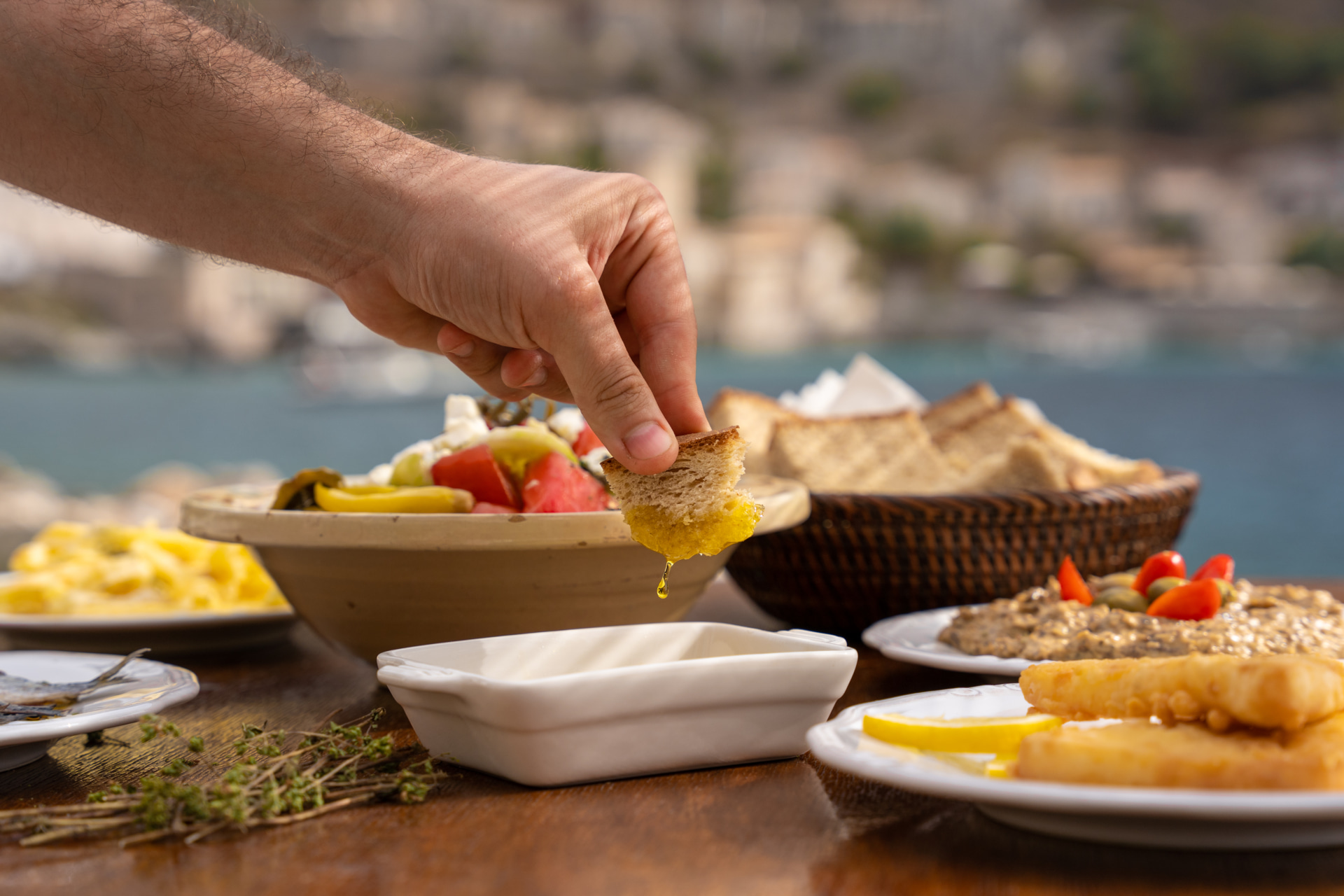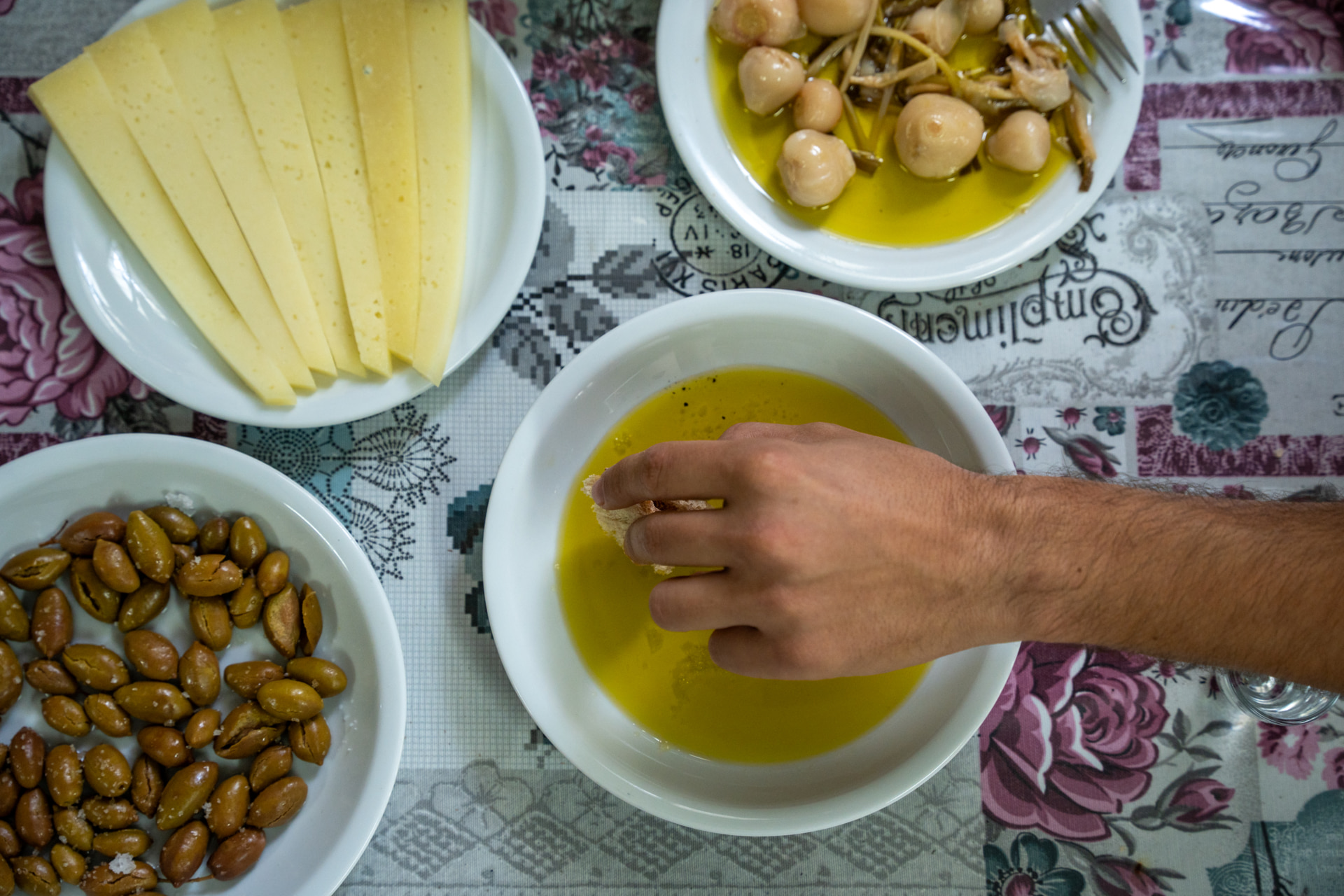Olive oil tasting in Greece: A guide for beginners
This is hardly surprising as Greece holds the top spot in Europe for per capita olive oil consumption, with around 11 to 12 litres per person annually. And even if you’re not Greek, can you imagine eating a Greek salad – tomatoes, onions, olives and feta cheese – without a generous drizzle of olive oil to top it off? But how many of us can claim to truly recognise a high-quality olive oil and evaluate it by taste?
So where do you start? The best way to deepen your understanding of Greece’s liquid gold is to book an olive oil tasting experience. And the good news is that, wherever you find yourself – on the mainland, in Crete, among the Ionian or Cyclades islands, or elsewhere – you’re likely to find olive groves that sell their product directly to consumers, some of which offer olive tasting experiences.
Greece leads Europe in olive oil consumption, and olive oil tastings across the country offer visitors a chance to deepen their appreciation for this essential ingredient. Guided tastings-available in regions like the Peloponnese, Crete, and Athens-teach participants how to assess olive oil quality using aroma, flavour, and texture, often in small group settings with expert guidance. Experiences typically include sampling several varieties, learning about production methods, and exploring food pairings, with no prior expertise required. Booking a tasting unlocks a richer understanding of Greek gastronomy and the unique qualities of olive oils from different regions.
Greece leads Europe in olive oil consumption, and olive oil tastings across the country offer visitors a chance to deepen their appreciation for this essential ingredient. Guided tastings-available in regions like the Peloponnese, Crete, and Athens-teach participants how to assess olive oil quality using aroma, flavour, and texture, often in small group settings with expert guidance. Experiences typically include sampling several varieties, learning about production methods, and exploring food pairings, with no prior expertise required. Booking a tasting unlocks a richer understanding of Greek gastronomy and the unique qualities of olive oils from different regions.
What do you need to go olive tasting in Greece?
Beyond taking a little time to find an olive oil tasting experience wherever you are in Greece, all you need to bring is your curiosity and have your senses fully engaged. Everything else will be taken care of for you.
The most important thing is to have a clean palate and to be in a space that is at room temperature and free from strong lighting or smells. Avoid eating a heavy or strongly flavoured meal for a few hours beforehand, so no lingering aftertaste interferes with the experience.
You’ll notice that the olive oil is usually served in small blue or red oval-shaped glasses. The colouring is no coincidence, as it ensures that you won’t be influenced by the colour as an indicator of quality, focusing solely on the aroma, flavour and texture of the olive oil.
Likewise, the shape of these special glasses is designed to ‘trap’ the distinctive aroma of the oil more effectively. To preserve the clarity of scent, avoid wearing strong perfume or cologne, as it can interfere with the tasting experience.
What to expect during the tasting
Your experience may vary slightly depending on the olive grove or press you choose. Typically, you’ll be offered 3–4 different olive oil samples, with some tasting experiences also including flavoured olive oils or other products made using traditional olive oil.
Many olive mills also in Greece combine olive oil tasting with a tour of the groves and pressing facilities and other types of workshops, offering even great insight into the olive varieties you’ll be sampling.
While bold Greek flavours, aromatic herbs and meze are central to the country’s culinary culture, they have no place in an olive oil tasting. It’s important to keep your palate clean so that the unique characteristics of each variety can come through. So don’t be surprised if no local delicacies are offered during the tasting. It’s more common to be given neutral flavours, such as bread, a slice of apple or just a little water, to avoid any taste interference.

How do you assess the quality of the olive oil?
The answer to this question is simple. You don’t need special technical knowledge or professional tasting experience. What matters most is to experience everything with all your senses, discovering the unique flavours of each olive oil. It’s absolutely fine if you can’t identify every characteristic, such as a fruity aftertaste or low acidity.
Focus on the key characteristics: Is it bitter? Does it have a thick texture or is it more fluid? Can you notice a difference between two oils made from the same fruit but extracted using different methods?
In olive oil tasting, there’s no right or wrong. The essence is to enjoy the process, learn how to taste and appreciate the unique qualities of each olive oil.
Tips to start your olive oil tasting journey
Begin by choosing a reputable provider for the best experience. It’s important to receive clear guidance on tasting techniques from an experienced and engaging professional, so you’re properly introduced to the art of olive oil tasting.
You’ll likely have the chance to explore the production process, see how the olive fruit is transformed into oil, and learn how factors like variety, extraction method and storage conditions affect the final product.
So don’t just focus on the oil itself – try to select a provider based on the overall tasting experience they offer. This will help you not only better understand the differences between oils, but also appreciate the importance of quality and origin.
Take the Peloponnese as an example. It boasts a long-standing olive oil tradition and many olive mills that you can visit. The regions of Messinia and Laconia, in particular, are renowned for their extra-virgin olive oil and offer deeper insights into the culture and gastronomy surrounding this precious product.

Experiment with different flavours
Your olive oil tasting journey in Greece doesn’t end there. Now that you’ve taken your first steps, keep sampling different varieties and types of olive oil in all the places you visit! In Greece, we produce olive oil from many different olive varieties and use a range of pressing and processing methods. From Crete to Halkidiki and from Corfu to Lesvos, you will encounter olive oils with distinct textures, acidities and flavour profiles, each with its own unique sense of place.
This way, you will gradually understand how different techniques, harvesting times, temperatures and olive varieties influence both the taste and texture of olive oil. It will also allow you to connect gastronomy with the original production process, revealing the detail and craftsmanship hidden within every drop.
Olive oil tasting in Greece
One thing’s for sure. By setting off on this journey of discovery, you will unlock a new appreciation for olive oil and a deeper connection to daily life in Greece. At the same time, you will gain a different culinary insight into the places you visit, appreciating even more the uniqueness of each location and the special qualities each region brings to its olive oil.
Discover Greece Your Way
Discover authentic local experiences and secure your bookings for activities and tours with our official online rates.
Athens: Olive Oil Tasting Masterclass
Heraklion: Cressida olive oil tasting by...
Chania: Olive Harvesting & Olive oil tas...
Naxos: Olive Oil tasting & Farm-to-Table...
Mykonos: Olive Oil Tasting at a traditio...
Kalamata: Traditional Food tour & Olive ...
Discover the highest-rated ground transportation services for travelers, based on reviews across Google, Tripadvisor, and Trustpilot.
Welcome Pickups offers a seamless, safe, and enjoyable experience for travelers
Trained Drivers
Hand picked & trained drivers
Low prices
Same price as a regular taxi from the line
Arrival monitoring
Drivers are always on time
Quality support
24/7 email & phone support

